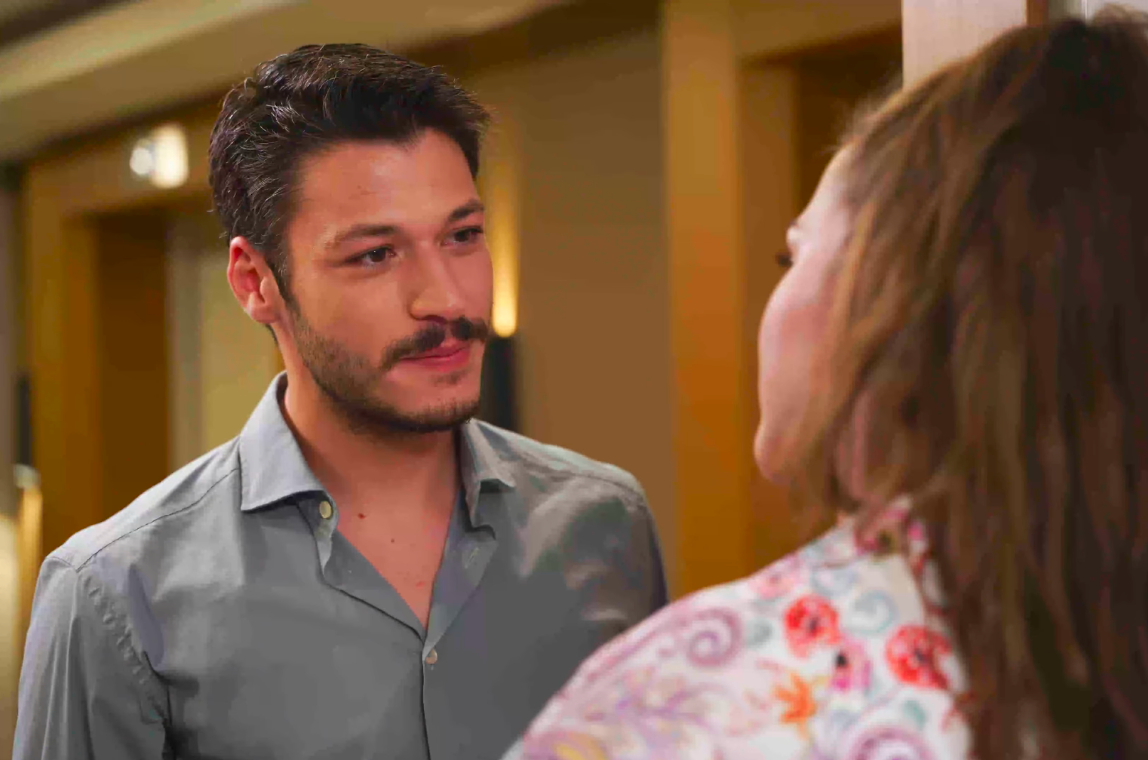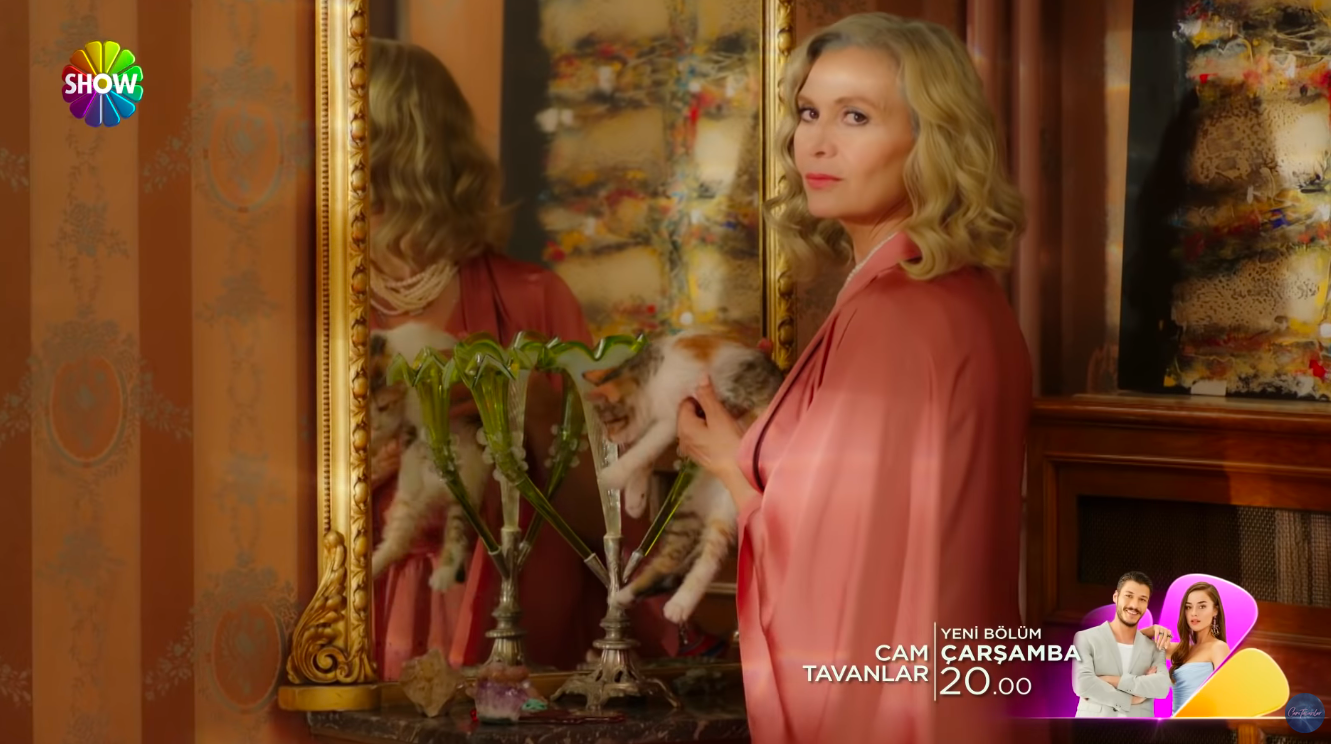The second installment of “Cam Tavanlar” confirms our initial enthusiasm for this unconventional summer dizi and Meriç Acemi's intelligent screenplay. While adding a good deal of comedy into the mix, the story continues to focus on the original premise – namely on the fact that, although women are increasingly part of the workforce, they find advancement to top leadership positions virtually impossible for reasons that have nothing to do with their capacity to do the job.
“GLASS CEILINGS”
With so many viewers inquiring about the meaning of the series’ title, this author investigated the term’s interesting origin. Historically, it is 19th-century feminist author George Sands, who first writes about “une voûte de cristal impenetrable” (an impenetrable crystal vault,) which prevents the female protagonist of her play “Gabriel” from ascending to greater heights. The term “glass ceiling” was then reprised in the US by feminists, scholars, and journalists alike during the 1980s to describe the barriers that keep women from rising to top management or leadership positions in any organization. Just a short while later, the term was extended to include the struggles that minorities face to advance in their careers.
In practice, the “glass ceilings” consist of hierarchical, organizational, and attitudinal barriers that are both invisible and impassable. They are not concrete physical obstacles, but insidious phenomena built on unconscious gender stereotypes and sexist misconceptions, whose sole purpose is to keep the highest leadership positions in the hands of Caucasian males (and the handful of token women, who choose to embrace their rules.)

The existence of “glass ceilings” produces negative consequences on women's mental health. It makes them feel constantly alienated and helpless in the workplace, and often induces them to give up on their professional ambitions. Those, who remain unaware (or in denial) of the “glass ceilings” often blame their own selves for their professional failings. On the other hand, women who point correctly to systemic issues such as religious tradition, discrimination, or macroeconomic forces, tend to consider themselves less negatively. Both groups, however, tend to doubt at some point their ability to succeed.
Professional employment provides both women and men with structure, identity, purpose, and opportunities for social interaction. Consequently, when women lose their jobs (or careers) because of the “glass ceilings,” they are likely to experience serious financial, physical, and mental health repercussions – such as poverty, grief, depression, anxiety, loss of identity, and even suicide. The situation is often made worse by ageism in the case of middle-aged women who, after suffering job loss, face virtually insurmountable obstacles in getting rehired.
The only way to break the “glass ceilings” is for women actively to demand opportunities and protections, which could free them from discrimination and other unjust employment practices. Women’s rights are human rights. Therefore, any invisible “glass ceiling” still preventing women from fulfilling their professional potential constitutes a violation of the basic human rights of the world’s “better” half.
RECAP AND ANALYSIS
In “Cam Tavanlar,” the glass ceiling, which Leyla repeatedly hits her head on, consists of the organizational culture of the Q-PERA group. In the company’s sexist environment, Leyla lacks mentorship, and is excluded from the “boys’ network. As episode one powerfully illustrates, the all-male board marginalizes her at multiple levels -- from the small-talk around the watercooler to the late-night drinking sessions at the “club”.

When the company brutally terminates her employment, Leyla correctly identifies the source of her troubles in the sexist structure of Q-PERA. She is very angry, of course, but thankfully never blames herself. Her youth, energy, intelligence, experience, tenacity, and survival skills, which she developed early on during her difficult childhood, supply her with the necessary determination to bounce back.
Meanwhile, kismet (or rather, the series’ brilliant screenwriter) determines that Leyla’s professional debacle should coincide with Cem’s return from Europe. He happens to be the only man, who captured her heart only to break it less than 24 hours later. Even worse, Cem is the manager hired to replace her at Q-PERA for no reason other than his gender. Consequently, he becomes the most immediate target of Leyla’s fury as she vows to prevail upon him and her former employers.

Just when viewers start bracing for the onset of the typical summer dizi’s endless inane bickering between the would-be-lovers, “Cam Tavanlar” delivers a welcome surprise. Cem accepts Leyla’s challenge, but – at the same time -- adamantly refuses to be labeled as the big bad wolf. He insists that he did not return intentionally to hurt her, just as he did not deliberately break her heart several years back. Moreover, Cem confesses to Leyla that seeing her again after so long stirs up emotions he thought forever buried. Clearly unsettled, Leyla tries her best to dissimulate. In a tone that is at the same time seductive and threatening, Cem promises her (and us) many exciting surprises for their immediate future.

Next, the episode illustrates Leyla’s efforts to restart her career virtually from zero. Her ambition is to open a new restaurant called “Lujuria,” and set it in direct competition with her former company. As her first order of business, she rents the establishment across from “Asude” (the first restaurant she established at Q-PERA) from the eccentric cat-lady Süreyya. Still a mysterious character, she is superbly interpreted by Hatice Aslan, who last played the role of Barış Arduç’s mother in “Kuzgun.”

Second, Leyla hires the fabulous but very temperamental Aylin as her head chef. For yet unknown reasons, she does not consider Iskender for the job. Her neglect deeply offends him. During the episode, Cem tries to befriend Iskender, so that he can extract from him valuable information about Leyla. It is indeed the chef, who informs a dumbfounded Cem that Leyla is alone in this world, with no family relations except the teacher who adopted her when her mother died. It remains, however, unclear whether Iskender is in love with Leyla, or they are just close friends. Be it as it may, we hope that he does not turn into another needy and malignant Yigit-like loser (remember the odious character that Utku Ateş interpreted in “Erkenci Kuş?”)

Third, she welcomes Şinasi (one of her most loyal collaborators from “Asude”) as “Lujuria’s” head waiter. Unfortunately, he is also the most annoying character in the series -- is there, by any chance, a law mandating that romcoms should always include one or more insufferable roles?
Finally, Leyla accepts to organize Gülar Hanim’s annual dinner at “Lujuria,” at an unreasonably close date. She will have to open the restaurant at the speed of light to meet the deadline. Clearly, the girl is not lacking in the hubris department.
In episode two, we met Cem’s father and grandfather. As their yacht indicates, the family is very wealthy. Cem’s parents separated a long time ago, and his father is somewhat of a womanizer. He longs for a life companion he can talk to but keeps hanging out with insipid young women. Grandpa is very much like the son. Cem, however, is the romantic one in the family. He longs to take care of the woman, who will be the love of his life. Despite their differences, there is clearly a wonderful relationship between the three men. Definitely a nice change from the countless dizi that set rich family members constantly against each other.

Next, Leyla and Cem travel to the countryside and engage in a fierce race to secure the best food suppliers for their restaurants. When her car breaks down, however, Cem stops to assist Leyla. This gives them a chance to talk calmly for the first time. Their banter is playful but substantive, and their chemistry clearly extraordinary. Cem seeks gently to provoke Leyla and she responds by giving him a piece of her mind. He does not even try to conceal his admiration for the splendid and tenacious girl, whose defenses are slowly starting to crack.
When he cannot repair her car, Leyla and Cem spend the night together at a farmhouse, where they share a room. The circumstances allow them to talk some more. He reiterates that he had nothing to do with her dismissal, but fears that Leyla might never believe him. Indeed, a flashback reveals that a few days after Cem suddenly abandoned the young woman during their first date, he came back looking for her at her college dorm. Convinced that he had lied to her about his girlfriend (Suna,) Leyla firmly rejected him. Since then, they never saw each other again until the fateful Q-PERA board meeting.

At this stage, our clever screenwriter introduces her favorite plot device: the apple. “Kiralik Aşk” fans will surely remember Meriç Acemi’s repeated use of elmalar tastefully to underscore the sexual tension between Defne and Ömer. In “Cam Tavanlar,” however, the cherry ostensibly serves that purpose. The apple appears instead to do the opposite – namely, diffuse tension. As episode one revealed, Leyla has the habit of sitting down to eat an apple whenever she needs breathing space. Sharing an apple with Cem, then, means that Leyla is willing to let the past go, at least for the time it takes to eat it. It is a small first step (but a first step nonetheless) towards establishing better reciprocal communication.

The next day, Cem and Leyla wake up to a beautiful morning. They have a lovely breakfast with their hosts. A bidding war between the rival restaurateurs to acquire the farm’s harvest turns unexpectedly into a joint offer to help the couple’s young girls get an education. Leyla may slowly be coming to the realization that Cem is not her enemy; that he is not like the other company men; and that the spark that lit between them years earlier may reignite at any time.
Thanks to her former bosses’ sabotage, Leyla is denied a bank loan to open her restaurant. The reason why the Q-PERA top men are obsessed with ruining this poor girl’s career is frankly hard to fathom. Hopefully, the series will explain at some point why they harbor such unjustified antagonism towards her. Consequently, Leyla is forced to take a loan from a “shark” – clearly a dangerous proposition, even if the loan shark in question is possibly the nicest one ever to grace our TV screens.

In the end, Leyla manages successfully to open her restaurant and host Gülar Hanim’s dinner. In so doing, she scores big points against Q-PERA, with Inci (the well-educated and thoughtful wife of Q-PERA’s CEO Haldun Bey) and Cem always rooting for her along the way. Leyla’s big night ends surprisingly with a kiss (and what kiss!) which she and Cem exchange by meeting each other at exactly halfway (how can one not love such brilliant details?) It is not the kind of stolen or surprise kiss that we often see in rom-coms, but the perfectly natural consequence of Leyla and Cem’s reciprocal attraction during a moment of joy. (Wait a minute though... was the kiss real or only a dream?)

PROS
Rumor has it that men in relationships do not have (or choose not to use,) emotional intelligence to engage with their partners. Contrary to expectations, however, Cem seems more in touch with his feelings (and those of others) than Leyla. He also appears better able to show and verbalize his emotions in a healthy and constructive manner. Perhaps for these reasons, Cem “gets” Leyla. He always tries hard to understand what is meaningful to her, and never withdraws his support – even when they are engaged in fierce competition.

Cem and Leyla are brilliantly delineated roles. What is more, Bensu Soral and Kubilay Aka are remarkably skilled at performing their characters’ elaborate dance. Their passionate push/pull dynamics remains firmly in the realm of a fair contest devoid of unnecessary harshness or conflict.
It is absolutely refreshing to see the lead protagonists of a summer dizi interact on a constructive basis. Moreover, Kubilay is a revelation as the "liberated" romantic male lead. His expressive eyes and tantalizing voice reflect sincere passion and concern for Leyla. On her part, Bensu Soral beautifully interprets the fresh, feisty, and sharp heroine of the series. Unlike Melek (the last character she interpreted in “Içerde,”) Leyla is determined, passionate, and warm. Her fans should be excited to see her spread her acting wings in such a different role.

CONS
Thus far, this author has only four minor criticisms of “Cam Tavanlar.” First, Leyla’s bosses at Q-PERA are far too caricatured. Their prejudices against women are so obvious and revolting as to appear unrealistic. Paradoxically, things would be easier for women, if their bosses were so crude. Unfortunately, their discriminatory practices are far more clever and subtle than those represented in the series.
Second, as with other romcoms (remember Koray in "Kiralik Aşk” ?) “Cam Tavanlar” nods to diversity by featuring a character (Şinasi) whose sexuality is uncertain. Once more, however, such character is obnoxious, to say the least. It is high time for Turkish diziler to create gay characters, who are open about their sexuality and convey realistic representations of homosexuals.

Third, Leyla’s faster-than-light ability to bounce back after losing her job is improbable. Indeed, it risks underestimating the disruption that workplace gender discrimination produces on women’s lives, health, and overall well-being.
Finally, we hope that Cem’s friendship with Iskender is more than a means to an end. It would be indeed disappointing if their relationship were to degenerate – like in so many previous diziler – into a nasty rivalry over a girl. It would also irreparably ruin these wonderfully progressive and open-minded male characters, who are liberated enough to consider women as their equals.

CONCLUSION
As far as this author is concerned, no summer dizi since “Kiralik Ask” and “Her Yerde Sen” has seriously attempted to trigger viewers’ response with an original script, which intentionally avoids the dejá vu, the trite, or the ridiculous. “Cam Tavanlar,” however, rises above other series by providing audiences with a story, which features liberated protagonists and substantive themes, and models emotional intelligence and constructive communication practices.
All sources for this article are included as hyperlinks. All pictures and video clips belong to their original owners, where applicable. No copyright infringement intended.
